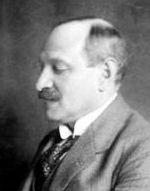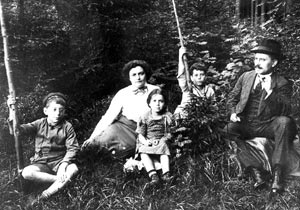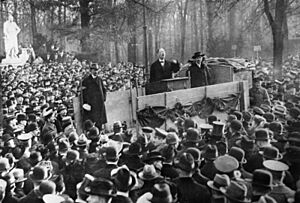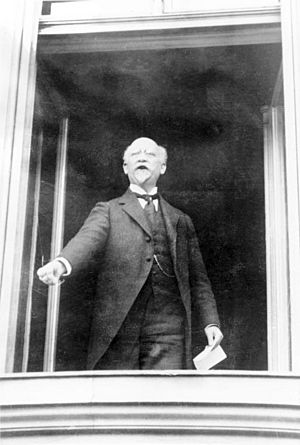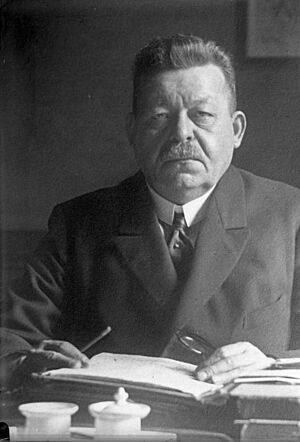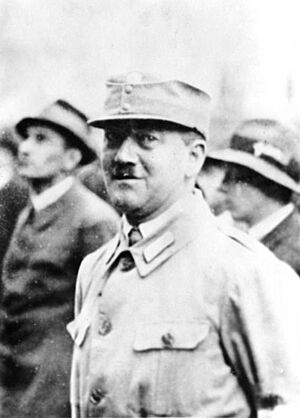Karl Liebknecht facts for kids
Quick facts for kids
Karl Liebknecht
|
|
|---|---|
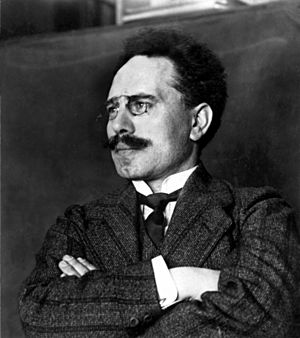
Karl Liebknecht, c. 1911
|
|
| Member of the Reichstag | |
| In office 1912–1918 |
|
| Personal details | |
| Born | 13 August 1871 Leipzig, Kingdom of Saxony, German Empire |
| Died | 15 January 1919 (aged 47) Berlin, German Republic |
| Citizenship | German |
| Nationality | German |
| Political party |
|
| Spouses | Julia Paradies (m. 1900; died 1911) Sophie Liebknecht (m. 1914) |
| Relations | Wilhelm Liebknecht (father) Natalie Liebknecht (mother) |
| Children | 3 |
| Alma mater | University of Berlin |
| Occupation | Lawyer Politician Revolutionary |
Karl Paul August Friedrich Liebknecht (German: [ˈliːpknɛçt]; 13 August 1871 – 15 January 1919) was an important German politician and revolutionary. He was a socialist and spoke out against war. He believed in fairness for all people.
Karl Liebknecht was a member of the Social Democratic Party of Germany (SPD) from 1900. He served in the German Parliament, called the Reichstag, from 1912 to 1916. He was known for his strong opposition to World War I. Because of his anti-war views, he was expelled from his party's group in Parliament in 1916. He was sent to prison twice for speaking out against war. He was freed from prison just before World War I ended.
During the November Revolution in Germany, Liebknecht declared Germany a "Free Socialist Republic" in Berlin on 9 November 1918. Two days later, he helped start the Spartacus League. Later, he was one of the founders of the Communist Party of Germany (KPD).
Contents
Karl Liebknecht's Early Life
Growing Up in Leipzig
Karl Liebknecht was born in Leipzig, Germany, in 1871. He was the second of five sons. His father, Wilhelm Liebknecht, was a key leader and founder of the Social Democratic Party. This party worked for workers' rights and social justice. Karl was baptized as a Lutheran. His godparents included famous thinkers Karl Marx and Friedrich Engels.
In the early 1880s, Karl lived in Borsdorf, near Leipzig. His father had moved there because of strict laws against socialists at the time. These laws were called the Anti-Socialist Laws.
His Education and Career
In 1890, Karl Liebknecht finished school in Leipzig. He then went to Leipzig University to study law. He continued his studies at the Friedrich Wilhelm University in Berlin (now the Humboldt University of Berlin). He finished his studies in 1893.
After university, he served in the military for a year. He then wrote his doctoral paper on law. In 1899, he became a lawyer in Berlin. He opened a law office with his brother Theodor. In 1900, he married Julia Paradies. They had two sons and one daughter.
As a lawyer, Liebknecht became well-known. He defended Social Democrats in important trials. He also spoke out against unfair treatment of soldiers in the military.
Standing Up Against War
Speaking Out Against Militarism
From 1907 to 1910, Karl Liebknecht led the International Union of Socialist Youth. He often spoke out against militarism. Militarism is when a country focuses a lot on its military and prepares for war. In 1907, he wrote a book called Militarism and Anti-Militarism. In this book, he explained how militarism could control people. He said it made people follow orders like a "herd of cattle."
He believed that people should be educated about the dangers of militarism. Because of this book, he was put on trial for treason. The court said he was trying to cause trouble. On 17 April 1907, he was sentenced to one and a half years in prison. His brave self-defense in court made him very popular among workers in Berlin.
Entering Parliament
In 1908, Liebknecht became a member of the Prussian House of Representatives. This was a state parliament. He was one of the first Social Democrats to join it. He remained a member until 1916.
His first wife, Julia, passed away in 1911. In 1912, he married Sophie Ryss.
In January 1912, Liebknecht was elected to the national Parliament, the Reichstag. He was one of the youngest members at 40 years old. He quickly became a strong opponent of military spending. He even showed that a large arms company, Krupp, had gotten secret information illegally.
Opposing World War I
In July 1914, just before World War I began, Liebknecht traveled to Belgium and France. He met with other socialist politicians. He realized the danger of a European war on 23 July.
When Germany declared war on Russia on 1 August, the Reichstag met. Most members of his party, the SPD, decided to vote for war loans. These loans would help pay for the war. Liebknecht and 13 other members strongly disagreed. However, to keep party unity, Liebknecht voted with the majority. He later saw this as a big mistake.
On 2 December 1914, the Reichstag voted on new war loans. This time, Karl Liebknecht was the only member who voted against them. He stood alone to show his opposition to the war. At the next vote in March 1915, another member, Otto Rühle, joined him in voting no.
In early 1915, Liebknecht was called to serve in the army. He was a non-fighting soldier on the Western and Eastern fronts. He was allowed to leave for Parliament sessions. Even while in the army, he continued to organize war opponents.
Founding the Spartacus League
On 1 January 1916, Liebknecht helped create the Spartacus League. This group was made up of strong opponents of the war within the SPD. On 12 January 1916, the SPD expelled Liebknecht from their group in Parliament. Otto Rühle also left in support of Liebknecht.
Liebknecht had few chances to speak in Parliament during the war. When he did speak, he was often shouted down. On 1 May 1916, he led an anti-war protest in Berlin. He shouted, "Down with the war! Down with the government!" He was arrested and charged with treason again.
His arrest made more people oppose the war. On 23 August 1916, Liebknecht was sentenced to four years and one month in prison. He was held in Luckau until he was released in October 1918. While he was in prison, his group, the Spartacus League, joined another socialist party, the Independent Social Democratic Party of Germany (USPD).
Liebknecht was one of the few German politicians who spoke out against human rights violations by Germany's allies, the Ottoman Empire. These included the Armenian genocide.
The November Revolution
Germany in Turmoil
Karl Liebknecht was released from prison on 23 October 1918. This was part of a general pardon. People hoped it would calm the country. But when Liebknecht arrived in Berlin, a large crowd cheered him. He gave a speech, saying, "Down with the Hohenzollerns! Long live the social republic of Germany!" The Hohenzollerns were the ruling family of Germany.
Liebknecht worked to reorganize the Spartacus League. He wanted to start a nationwide revolution. He planned a general strike and armed protests. However, other socialist groups wanted a more peaceful change.
On 8 November, a sailors' uprising in Kiel started a revolution across Germany. On 9 November, huge crowds gathered in Berlin. From a window at the Berlin Palace, Liebknecht declared the "Free Socialist Republic of Germany." Earlier that day, another politician, Philipp Scheidemann, had declared the "German Republic" from the Reichstag building.
Founding the Communist Party
Liebknecht became a key voice for the revolutionary left. He and Rosa Luxemburg started a daily newspaper called Die Rote Fahne ('The Red Flag'). They wanted Germany to become a socialist republic led by workers' councils. However, most workers' representatives wanted a more moderate social democratic government.
In December 1918, the interim government, led by Friedrich Ebert (SPD), tried to reduce the power of the workers' councils. Ebert made a secret agreement with the army to stop leftist uprisings. On 24 December, the government used military force against a group of sailors. This led to the resignation of some socialist leaders from the government.
The Spartacus League gained more support. At the end of December 1918, they founded a new party. On 1 January 1919, the Communist Party of Germany (KPD) was officially created.
The Spartacist Uprising
Starting on 8 January, Liebknecht and other KPD members took part in the Spartacist uprising. This began with a general strike and the occupation of newspaper buildings in Berlin. Liebknecht joined the strike leaders. He called for an armed uprising to overthrow the government.
However, the uprising did not have much support from the working class. When the government sent the military against the rebels on 11 January, they were quickly defeated. About 180 people died in the fighting.
His Tragic Death
Soon after the uprising was put down, Karl Liebknecht and Rosa Luxemburg were captured. They were killed by members of a military division. The officers Horst von Pflugk-Harttung, Heinrich Stiege, Ulrich von Ritgen, and Rudolf Liepmann are considered Liebknecht's murderers.
No one was ever brought to justice for ordering these murders. After their deaths, both Liebknecht and Rosa Luxemburg became symbols for the socialist movement in Germany and Europe. People still remember them today.
Memorials
Every year in Berlin, people hold events to remember Liebknecht and Luxemburg. These events happen on the second Sunday in January.
In East Germany, Karl Liebknecht was honored as a hero of socialism. Many monuments, streets, and schools were named after him. Some of these names were changed after Germany was reunified in 1990, but others remain.
See also
 In Spanish: Karl Liebknecht para niños
In Spanish: Karl Liebknecht para niños
 | Janet Taylor Pickett |
 | Synthia Saint James |
 | Howardena Pindell |
 | Faith Ringgold |


